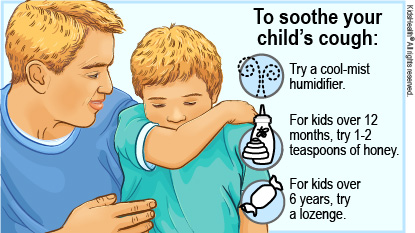Flu-Like Illness: How to Care for Your Child
Kids with a flu-like illness may have a fever, cough, sore throat, headache, body aches, and other symptoms. It is caused by a virus (a type of germ). It’s called “flu-like” because its symptoms are similar to those of influenza (“the flu”), but may not be caused by the same virus.
Most kids and teens with a flu-like illness feel better within 1 to 2 weeks.


-
Follow your health care provider’s instructions for giving any prescribed medicines.
-
Give acetaminophen (Tylenol® or a store brand) or ibuprofen (Advil®, Motrin®, or a store brand) for fever, sore throat, or body aches. Read the package label and follow the instructions on how much to give and how often to give it.
-
Do not give aspirin to your child or teen, as it has been linked to a rare but serious illness called Reye syndrome.
-
Do not give cough or cold medicines to children under 6 years old because they can cause bad reactions. Only give these medicines to children over 6 years old if your health care provider says it’s OK.
-
Let your child rest as needed.
-
Offer your child plenty of liquids. Babies can continue to breastfeed or take formula.
-
To soothe your child's cough:
-
Run a cool-mist humidifier in your child's bedroom. Clean after each use.
-
If your child is older than 12 months, it's OK to give 1–2 teaspoons of honey at night. If your child is under 12 months old, do not give honey.
-
To help with a runny or stuffy nose:
-
Run a cool-mist humidifier in your child's bedroom. Clean after each use.
-
For babies: Put a few drops of saline (saltwater) into the nose, then gently suction the mucus out with a bulb syringe. Do this no more than 2–3 times a day so that the inside of your baby's nose does not get swollen or sore.
-
For older kids: Give 2 sprays of saline nose spray 3 times a day.
-
Your child can return to school and activities when they:

Your child:
-
has symptoms that are getting worse (such as a cough or headache)
-
has new symptoms (such as ear pain)
-
does not feel better in 3–4 days or is getting sicker
-
has a fever that returns after being fever-free for 24 hours
-
appears dehydrated; signs include dizziness, drowsiness, a dry or sticky mouth, sunken eyes, crying with few or no tears, or peeing less often/having fewer wet diapers

Your child:
-
has trouble breathing. Signs include fast breathing, the muscles pulling in between the ribs, or the nose puffing out with each breath.
-
gets a stiff neck
-
seems very sleepy or confused

How does a flu-like illness spread? Viruses that cause flu-like illnesses spread from person to person. They can spread when a person with the virus coughs and/or sneezes the virus into the air and someone else breathes it in. Viruses also can spread when someone touches the virus on another person or a hard surface (such as a doorknob), and then touches their own eyes, nose, or mouth.
To help reduce the spread of viruses, teach kids to:
-
Sneeze into a tissue, if possible, then throw the tissue away and wash their hands well. If a tissue is not available, they should sneeze into their upper sleeve or inner elbow, not their hands.
-
Wash hands well and often with soap and water and scrub for at least 20 seconds. This is especially important after coughing or sneezing, or after having a bowel movement. If soap and water are not available, they can use a hand sanitizer with at least 60% alcohol.
During the coronavirus pandemic, experts found that wearing masks can help protect the community from the spread of germs. They recommend that all children age 2 and up wear a mask when out in public or around people who don’t live with them.
Is there treatment for a flu-like illness? Antiviral medicines are available to treat some types of viruses. Antibiotics will not treat a flu-like illness because it is caused by a virus. Antibiotics only work against bacteria, not viruses.
Should my child still get the flu vaccine? Yes, your child should still get the flu vaccine. During the coronavirus pandemic, this is extra important. Some health experts worry that people who get the flu and COVID-19 at the same time might have a more serious illness. Also, doctor's offices, hospitals, and urgent care centers will likely be busy caring for many people with COVID-19 this flu season. Preventing flu in your family will help you avoid needing medical care when health care providers are under so much strain.